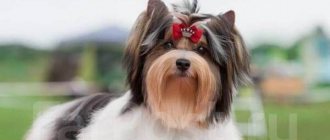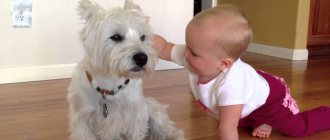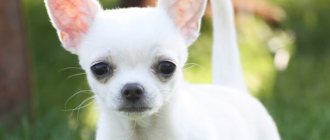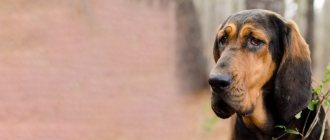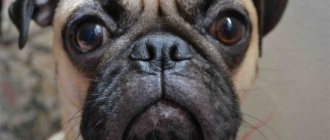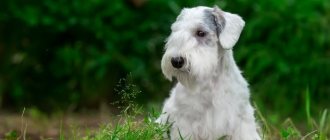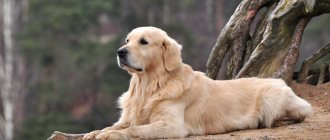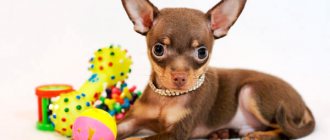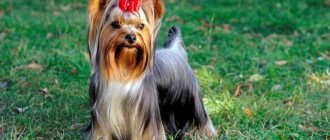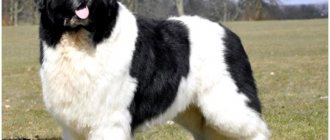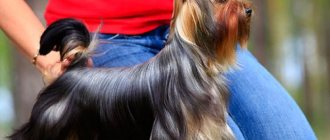Almost all people who are just choosing a dog have thought: is it worth getting a Yorkshire terrier? The pros and cons of the breed speak for themselves. These dogs adapt well to urban environments, becoming faithful companions, little guards for adults and cheerful friends for children.
But there is another side: Yorkshire terriers who have not received the right education grow up hysterical and prone to neuroses. They don't listen well if they haven't learned commands in their early years, and their hypoallergenic coat requires special care. But about all the advantages and disadvantages of Yorkies in order.
Characteristics and description of the breed
The history of Yorkshire terriers goes back more than three hundred years. At first they were used to fight rats and mice, and later the breed became decorative and in this capacity gained extraordinary popularity. Yorkies inherited stamina, energy from terriers, and acquired the beauty and grace inherent in indoor dogs. A distinctive feature of the breed is its long flowing coat, reminiscent of women's hair. The colors of Yorkies are varied - gray, steel, red, brown, variegated, plain. Dogs vary in size - standard, mini, micro (or super-mini).
Breed standards
According to the standard, the main characteristics of the Yorkshire Terrier are as follows:
- height at withers up to 28 cm;
- weight up to 3.2 kg;
- wool with beautiful strands, long, flowing, without undercoat;
- the body is compact, with a strong build;
- claws and nose black;
- ears are straight, erect;
- high tail;
- character is courageous, curious, teachable.
Head, eyes, ears
Despite its size, the Yorkshire Terrier's posture is important and proud. The head is small, the skull is flat, without protrusions, with a pronounced transition from the forehead to a short muzzle. The nose is small, with a black nose. The teeth are small, white, straight set, jaws close together without gaps, scissor bite.
The Yorkie's eyes are round or almond-shaped, medium in size, not protruding. The iris is brown, the eyelids are dark-rimmed. The ears are hard, erect, set wide apart, and densely covered with hair.
Body and limbs
The body of the Yorkshire Terrier is quite compact, the chest is rounded, and the shoulder girdle is strong. The loin is short. The tail is covered with dark hair and is always raised above the back. It is left intact or cut to half its length.
The dog's legs are straight, even, and parallel. The knee and hock joints are well developed, the articulation angle is normal. The paws of the Yorkshire Terrier are compact, rounded, the claws are convex, slightly curved, and black.
When moving, the step is relaxed, the back is straight. The coat is very beautiful - shiny, silky. The strands are straight, falling along the sides of the body.
Temperament and character of a Yorkie
Endless loyalty and devotion to the owner allow us to call the Yorkshire Terrier a companion dog. He cannot stand loneliness and is ready to accompany his owner everywhere. This little dog inherited fearlessness from its ancestors; it acts as a watchman and warns of danger. Energy and mobility are one of the main qualities of Yorshiki; they do not sit still, they love to run and play. Representatives of the breed prefer to dominate, so it is necessary to show in time who is the boss and leader in the house, to teach them to obey without hesitation. It happens that Yorkshire terriers show increased aggression towards other animals. In this case, early socialization of the pet helps.
Yorkie intelligence
Intelligence is one of the hallmarks of Yorkshire Terriers. They are highly trainable and learn commands very quickly. Sometimes they are not performed the first time due to stubbornness, which must be dealt with from a very early age. You can’t punish them physically, but ignoring them and showing resentment by the owner gives the desired result. The method is effective, since the Yorkshire terrier has well-developed intuition and can easily read the mood of those around him.
Where can I buy. How to choose a puppy
Yorkshire Terriers are one of the most popular and promoted breeds of small dogs in the world. The Internet is replete with offers for the sale of puppies. Take your time to make a purchase. Choosing a new family member based on a photo is risky. Subsequently, he may not live up to your expectations. It’s better to contact local breeders and visit breed nurseries yourself.
A good breeder will be happy to show you the mother of the babies. If possible, then dad too. Shows the pedigree of the parents. Will tell about their exhibition career.
Tell the owner of the kennel for what purpose he is purchasing a Yorkshire Terrier puppy. Depending on this, he will offer you candidates. Anyone who dreams of participating in dog shows or breeding will be offered expensive puppies - show or breeding class. If you just need a friend and companion, perhaps a pet-class baby will do. This is a healthy puppy, but with slight deviations from the breed standard. He will love you no less than his standard siblings. It will cost less.
Have you decided to make your own choice? Start watching the kids. Give preference to an active, cheerful puppy who stands confidently on his feet. The baby's back should be straight. The nose is wet if he is awake. When sleeping, it can be dry. Gums are bright pink. Eyes and ears - no discharge. The tummy should not be bloated. The coat is silky and straight.
If you are planning a show career for your pet, first of all pay attention to the puppy's coat. Give preference to a baby with a dark color and red-golden spots. They can be on the chest, muzzle, the inside of the legs and under the tail - of different sizes and shapes. Do not take puppies with colors that do not meet the standard. The breeder may convince you that the baby will bloom. Don't believe it! Only a small white spot on the chest, if present, can completely rebloom.
After the transaction, the breeder must give you and your four-legged baby a veterinary passport, which records the vaccinations performed. And also a puppy card, which you will later exchange for the pet’s pedigree. Please note that the puppy's brand number must match the number written on the card.
Be careful when choosing a mini Yorkie! Don't buy it from strangers. Fraudsters often sell small, unhealthy dogs under their guise.
How much does a Yorkshire Terrier cost?
The price for Yorkshire Terrier puppies varies from 15 to 80 thousand. Depends on the status of the kennel and the class of the puppy.
A pet-class Yorkshire Terrier puppy will cost 15-20 thousand, breeding - 20-35 thousand, show class - from 35 and above.
Girls always cost a little more than males.
Four-legged babies without documents can be purchased for 5-10 thousand. But you need to understand that the quality of such puppies may be low. Be prepared that instead of a Yorkshire terrier you will grow up a dog of an unknown breed that vaguely resembles a Yorkie. But this is not the worst option. It is much worse if the dog suffers from serious illnesses.
Pros of the breed
Many dog breeders choose Yorkies from a wide variety of breeds and note their positive aspects:
- goodwill and affection for the owners;
- non-aggressiveness;
- high intellectual abilities;
- mobility (easy to travel);
- spectacular appearance;
- hypoallergenic due to the absence of undercoat;
- no heavy shedding;
- easy training to the tray;
- endurance and good health;
- long life expectancy;
- They can perform security functions and bark at strangers.
Appearance
The skull is flat, small in shape, proportional to the body, and the ears are triangle-shaped and stand up. The coat is glossy, straight, thick, not fluffy, shiny. On the head and muzzle - long, golden brown brighter on the sides of the head, on the tips of the ears and in the longest places on the muzzle. The fur is slightly darker at the very tip of the tail.
An interesting fact is that the Yorkie hardly sheds due to the lack of undercoat, and its hair is very similar to human hair; it falls out due to mechanical factors or disease.
Straight, developed limbs and hind legs create an angle. The animal is active, with round beady eyes.
Active, cheerful dog, without aggression. Recently, babies' tails have been docked, but over time this fades into the background and is not necessary.
An important point for males is the descending testicles into the scrotum; if a male with age remains without the main male indicator, then this is a defect of the breed - cryptorchid.
Cons of the breed
So that the dog’s shortcomings do not come as a surprise to the owner, you need to know why and for whom a Yorkshire terrier can be bad. Owners note several disadvantages of the breed:
- stubbornness;
- tendency to bark long and loudly;
- jealousy towards children and other animals;
- difficulties in caring for hair;
- frequent problems with digestion, teeth, ears;
- high price of puppies.
Most of the shortcomings can be successfully leveled out with the help of proper education and care for the pet’s health.
The disadvantages are more pronounced in mini Yorkshire terriers. They are more nervous, the joints and bones of babies are fragile, and females often have problems during childbirth.
Before getting a Yorkie, you should weigh the advantages and disadvantages of the breed and only then make a decision.
Yorkie character
The sweet, graceful and often touching appearance contrasts sharply with the character of this dog. She is not at all ready to be a “couch dweller,” although she does not need serious physical activity. Yorkshires are curious and inquisitive, playful and active. At times they show stubbornness and independence, and therefore, when getting this dog, you definitely need to devote time to its upbringing and training. Otherwise, if you don’t deny her anything and indulge in any “whims,” the Yorkie, like a true terrier, may consider himself the “leader of the pack” and become completely uncontrollable.
Usually dogs become so attached to their owner that they are ready to follow him literally on his heels and accompany him everywhere. They are quite hardy and not capricious if the owner is nearby. They are ready to play and run outside, and therefore will be good companions in families with children. However, you should not have a puppy in a house where there are children under six years old. Yorkies are fragile creatures, and children never miss the opportunity to cuddle them. Too much hugging can injure your puppy.
pixabay.com/
Pet care and maintenance
Most often, Yorkshire terriers are purchased at the age of three months. By this time, he is already accustomed to the tray, follows some commands, and is familiar with many care procedures. At first the puppy is bored. He needs to be calmed down and moved to a cozy place prepared in advance. The diet is not changed during the first weeks, they are fed the same as the breeder.
Care for eyes, ears, coat
Your pet's eyes should be looked after daily. By wiping them with a cotton pad soaked in chamomile infusion, you can avoid eczema and increased lacrimation.
Once a week, the ears are examined and cleaned using special lotions. If inflammation in the auricle or ear canal becomes noticeable, contact a veterinarian.
The Yorkshire Terrier's coat requires special care - daily combing, trimming once every three months (by a specialist) and washing once every two weeks. More frequent bathing leads to dry skin.
Diet
The Yorkshire Terrier's diet is selected based on its weight and health status. A prerequisite is low fat content and calcium saturation. The best option is premium food.
When feeding with natural products, the diet includes:
- Finely chopped liver.
- Lean meat (rabbit, turkey, minced beef).
- Fruits (unsweetened pears and apples).
- Cottage cheese, cheese, kefir.
- Freshwater fish.
- Boiled and fresh vegetables (pumpkin, zucchini, carrots, cauliflower).
Unlike dry food, natural products do not bother your pet and are easily digestible, but they require a lot of time to prepare, since the food must be fresh.
Industrial feeds have their advantages - their composition is balanced, storage is simple and long-lasting, use is convenient, and granules help get rid of tartar. Each owner chooses their own type of feeding, but you should know that Yorkshire terriers cannot be given food from their table, legumes, citrus fruits, pasta, mushrooms, bread, pastries, milk and tubular bones.
Walking the dog
You need to take your puppy out for walks as early as possible. Before vaccination he is held in arms, after vaccination he is held on a leash. Yorkie must get used to using the toilet outside and become familiar with the environment and other dogs. Walking time is not limited, but pets get tired quickly, so they are periodically carried in arms. The walking area should be free of holes, garbage, food waste and broken glass.
Yorkshire Terriers should not be allowed to jump from your hands. This often leads to fractures and dislocations.
In winter, dogs need to be warmed with special clothing and shoes, in summer they must be treated against ticks and skin parasites, walked in the shade, and given water more often.
Power Requirements
Experts recommend feeding Yorkies with commercial food designed specifically for this breed. But if you wish, you can feed your dog natural food with the addition of vitamin and mineral supplements.
In any case, nutrition should be complete and of high quality.
CAREFULLY!
You should not overfeed or underfeed your Yorkie, as both extremes are very harmful for small dogs.
Is it easy to keep a Yorkshire Terrier in an apartment?
Yorkie is an ideal dog for an ordinary apartment. She is small (height 22 cm, weight up to 3 kg), it is easy to train her to a tray, so the number of walks can really be reduced to a minimum. It is enough to take it outside in the morning and evening, after which the pet will sleep all night without disturbing its owners. Even children can cope with walking. The main thing is that the dog obeys and is not let off the leash.
Do I need to go for a walk?
Like all other dogs, Yorkies need active play in the fresh air. In addition, on walks they get to know the world around them and communicate with other dogs.
This is why they need walks and, despite the fact that these dogs can get by with a diaper or litter box at home, they need to be taken outside at least when the weather allows it.
Life expectancy of a mini Yorkshire terrier
By providing your Yorshik with proper care, you can expect it to live for at least 12-16 years. The lifespan of a dog depends on past diseases, heredity, feeding and quality of maintenance. Breeders note that males live longer than females, whose health is affected by pathologies of the reproductive organs. But Yorshi boys are also susceptible to diseases of the genitourinary system, which often causes early death.
Mini Yorkies live less than the standard type - only seven to nine years. Micro-sized dogs have an even shorter life—no more than seven years.
What to consider when choosing the gender of a Yorkshire Terrier
Despite the cuteness and charm of all puppies, you should weigh the pros and cons before choosing the sex of your Yorkie.
Pay attention to the nuances:
- Males have a violent temperament, prefer to dominate, during puberty they become overly active, run away from their owner in search of a girlfriend, are prone to masturbation, and mark their territory.
- Bitches are calmer, more obedient, and prone to false pregnancy.
If Yorkshire terriers are not planned to be used for breeding, it is recommended to castrate males and sterilize females.
Is it difficult to care for?
The main difficulty in keeping these dogs is caring for their coat.
It is also necessary to pay special attention to the fact that the Yorkie is a breed that cannot do without clothes. The fact is that wool devoid of undercoat does not protect them well from cold and dampness.
In all other respects, caring for Yorkies is no more difficult than caring for any other breed of dog.
Owner reviews
Svetlana, Moscow:
Yorkshire Terrier is my first dog. This is my beloved girl who brightened my life, everywhere and always with me. Taking care of her is not difficult, it is even pleasant. She is so happy and waiting for me, it’s impossible to convey.
Polina, Samara:
Yorika gave them to her twins two years ago. We feed with natural products. We don't cut his hair often, walk him twice a day. Our boy has a fighting character and is friendly towards us. He can bark at strangers for hours. When meeting, he caresses and licks without measure.
